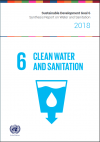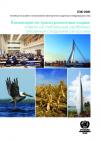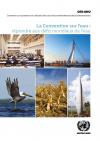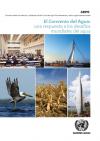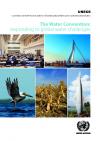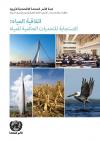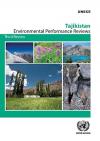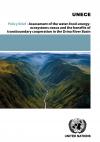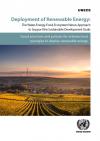Publications
Displaying Results 121 - 140 of 618
- English
Cooperation over transboundary rivers, lakes and aquifers is critical to ensuring that water resources are managed in an equitable and sustainable manner, and the achievement of SDG6 (water). Transboundary waters also create social, economic, environmental and political inter-dependencies that make cooperation a precondition to sustainable development, peace and security. As the only
- English
The Sustainable Development Goal 6 Synthesis Report 2018 on Water and Sanitation builds on the data available for the 11 SDG 6 global indicators. Representing a joint position from the United Nations family, the report offers guidance to understanding global progress on SDG 6 and its
- Pусский
- Français
- Español
- English
- العربية
- العربية
This publication presents the Principles for Effective Joint Bodies for Transboundary Water Cooperation that were formally adopted by the Meeting of the Parties to the Water Convention at its seventh session (Budapest, 17-19 November 2015). Countries sharing transboundary waters worldwide are encouraged to make use of them when establishing new joint bodies or strengthening existing ones.The
- Pусский
This publication presents the Principles for Effective Joint Bodies for Transboundary Water Cooperation that were formally adopted by the Meeting of the Parties to the Water Convention at its seventh session (Budapest, 17-19 November 2015). Countries sharing transboundary waters worldwide are encouraged to make use of them when establishing new joint bodies or strengthening existing ones.The
- Français
This publication presents the Principles for Effective Joint Bodies for Transboundary Water Cooperation that were formally adopted by the Meeting of the Parties to the Water Convention at its seventh session (Budapest, 17-19 November 2015). Countries sharing transboundary waters worldwide are encouraged to make use of them when establishing new joint bodies or strengthening existing ones.The
- Español
This publication presents the Principles for Effective Joint Bodies for Transboundary Water Cooperation that were formally adopted by the Meeting of the Parties to the Water Convention at its seventh session (Budapest, 17-19 November 2015). Countries sharing transboundary waters worldwide are encouraged to make use of them when establishing new joint bodies or strengthening existing ones.The
- English
This publication presents the Principles for Effective Joint Bodies for Transboundary Water Cooperation that were formally adopted by the Meeting of the Parties to the Water Convention at its seventh session (Budapest, 17-19 November 2015). Countries sharing transboundary waters worldwide are encouraged to make use of them when establishing new joint bodies or strengthening existing ones.The
- English
This report presents the findings from the assessment of the water-food-energy-ecosystems nexus, linked with a study of benefits of transboundary cooperation, in the Drina River Basin, mainly shared by Bosnia and Herzegovina, Montenegro and Serbia which was carried out from 2016 to 2017 in the framework of the UNECE Water Convention’s Programme of Work. The assessment aimed to foster
- Pусский
- English
- English
This policy brief synthesizes the main findings and recommendations from the assessment of the water-food-energy-ecosystems nexus ─ essentially of intersectoral links, trade-offs and benefits ─ in the Alazani/Ganykh River Basin, shared by Azerbaijan and Georgia in the Caucasus, that has been carried out in the framework of the UNECE Water Convention’s programme of work for 2013–2015. The
- Pусский
The present publication contains the third Environmental Performance Review of Tajikistan. The report takes stock of progress made by the country in the management of its environment since 2010. It also covers issues of specific importance to the country related to legal and policy frameworks, the financing of environmental policies, greening the economy, and integrating environmental concerns
- English
The present publication contains the third Environmental Performance Review of Tajikistan. The report takes stock of progress made by the country in the management of its environment since 2010. It also covers issues of specific importance to the country related to legal and policy frameworks, the financing of environmental policies, greening the economy, and integrating environmental concerns
- English
This policy brief synthesizes the main findings and recommendations from the assessment of the water-food-energy-ecosystems nexus, linked with a study of benefits of transboundary cooperation, in the Drina River Basin, mainly shared by Bosnia and Herzegovina, Montenegro and Serbia which was carried out from 2016 to 2017 in the framework of the UNECE Water Convention’s Programme of Work.
- English
The 2030 Agenda for Sustainable Development includes Sustainable Development Goal (SDG) 7 on access to energy and the related targets set the ambition for increasing the share of renewable energies in the energy mix. Their achievement is closely linked water management (part of SDG 6 on water and sanitation) but also to many other SDGs, notably on food security and sustainable agriculture (SDG 2


